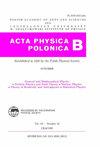未来对撞机中的长寿命粒子
IF 1.4
4区 物理与天体物理
Q3 PHYSICS, MULTIDISCIPLINARY
引用次数: 0
摘要
长寿命粒子的寿命足够长,当在碰撞中产生时,会在探测器中留下明显的特征。在越来越高的能量的驱动下,粒子对撞机的触发和重建算法针对越来越重的粒子进行了优化,而这些粒子往往是短命的。这使得搜索长寿命粒子变得困难,通常需要专门的方法,有时还需要专门的硬件来找到它们。然而,迎接这一挑战带来了巨大的潜力,因为新的长寿命粒子出现在各种有前景的新物理模型中,这些模型可以回答标准模型中的大多数悬而未决的问题,例如:中微子质量、暗物质或宇宙中的物质-反物质不平衡。本文章由计算机程序翻译,如有差异,请以英文原文为准。
Long-lived Particles at Future Colliders
Long-lived particles have significant enough lifetimes as to, when produced in collisions, leave a distinct signature in the detectors. Driven by increasingly higher energies, trigger and reconstruction algorithms at particle colliders are optimized for increasingly heavier particles, which in turn, tend to be short-lived. This makes searches for long-lived particles difficult, usually requiring dedicated methods and sometimes dedicated hardware top spot them. However, taking upon the challenge brings enormous potential, since new, long-lived particles feature in a variety of promising new physics models that could answer most of the open questions of the standard model, such as: neutrino masses, Dark Matter, or the matter-antimatter unbalance in the Universe.
求助全文
通过发布文献求助,成功后即可免费获取论文全文。
去求助
来源期刊

Acta Physica Polonica B
物理-物理:综合
CiteScore
1.70
自引率
20.00%
发文量
30
审稿时长
3-8 weeks
期刊介绍:
Acta Physica Polonica B covers the following areas of physics:
-General and Mathematical Physics-
Particle Physics and Field Theory-
Nuclear Physics-
Theory of Relativity and Astrophysics-
Statistical Physics
 求助内容:
求助内容: 应助结果提醒方式:
应助结果提醒方式:


